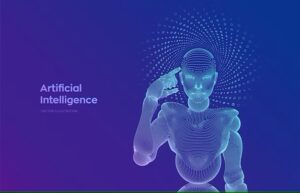
Artificial intelligence is a hot topic in current research. As an emerging general technology, artificial intelligence has huge application space and unlimited potential in various fields. At present, artificial intelligence has replaced some jobs, which has caused some unemployment and caused people to worry about their future employment. But artificial intelligence is also subject to many restrictions while replacing jobs. The future trend will still be human-computer collaboration. The development of artificial intelligence will also bring new job opportunities to people. It should actively respond to the development of artificial intelligence and improve its own ability to work intelligently to adapt to new job changes.
The rapid development of artificial intelligence and modern technology on a global scale has aroused great attention. Artificial intelligence technology has now penetrated into people’s daily life and changed people’s lifestyles. For example, Apple’s smart assistant “Siri” can guide users to use mobile phone functions, and can use machine learning technology to grasp user habits and improve their own performance. Amazon’s life assistant robot “Alexa” can help users to schedule trips and conduct online shopping. At the same time, its powerful performance has also aroused great concern from all walks of life. For example, from 2016 to 2017, the artificial intelligence robot Alpha GO developed by Google Deep Mind won a great advantage when playing against professional chess players. It even made people marvel at the ability of artificial intelligence, and even fear it. People began to worry about whether the powerful performance of artificial intelligence would deprive people of jobs and make a large number of people unemployed. When artificial intelligence was proposed from the concept, researchers were committed to using machines to imitate human behavior, so as to use the machine to complete some tasks that only humans can doThis article will analyze the impact of artificial intelligence on employment from multiple angles by looking for information and combining actual cases.
1. The concept and status of artificial intelligence
Artificial Intelligence (Artificial Intelligence), referred to as AI, was proposed by John McCarthy in 1956. After more than 60 years of development, it has now developed to a very high level. The definition of artificial intelligence by NJ Nielson of the Artificial Intelligence Center of the Stanford Research Institute in the United States is: artificial intelligence is a discipline about knowledge-how to express knowledge and how to obtain knowledge and use knowledge. The definition of artificial intelligence can be divided into “artificial” and “intelligent” two parts, “artificial system” is the things that human beings can usually do. There are many problems and controversies about “intelligence”. Since the necessary elements of the current scientific research to constitute human intelligence are quite limited, it is difficult to define what is artificial intelligence. Therefore, the research of artificial intelligence will involve the study of human intelligence itself.
Artificial intelligence is currently widely developed in the computer field, and has been used in commercial marketing, speech recognition, deep learning, P2P networks, and image recognition systems. In employment, it has penetrated into all walks of life. Some new technologies in the past are often limited to specific fields and industries, and cannot be used across industries, so their impact on employment is quite limited. But artificial intelligence technology is different from it, it is more versatile, and involves a wide range of industries in people’s employment. Some industries even face the situation of being replaced by artificial intelligence.
The impact of artificial intelligence on jobs
1. Impact on job structure
Today’s artificial intelligence can achieve the replacement of manual labor and certain mental labor, making people’s employment methods more diversified, employees become more free at work, and will face new problems and challenges.
The combination of artificial intelligence technology and production has greatly improved production capacity and changed the form of labor and employment. With the popularization of artificial intelligence technology, the proportion of manual workers has decreased significantly, and a large number of employees on the assembly line have been replaced by artificial intelligence robots. The proportion of mental workers and intellectual workers will increase. In the future, laborers with higher knowledge and technical capabilities, such as researchers and technicians, may have greater demands in their work. Providing jobs that require flexible problem solving and flexible communication, such as personal customization, may also require more employees to participate. The development of artificial intelligence will have a disruptive impact on many mental workers, and intellectual labor will become an important threshold for employment.
The ability to innovate will become more important and become an indispensable part of work. In the context of the rapid development of artificial intelligence, employment methods have undergone tremendous changes. For workers, they have also put forward higher requirements. Today’s practitioners need to pay attention to improving their innovation ability and knowledge level, and integrate innovation ability into daily life. In the era of artificial intelligence, manual labor and mental labor that can be replaced by programming and intelligent machines will lose room for development; irregular, complex thinking and more flexible intellectual labor will have greater development potential. Workers must have the ability of intelligent robots to replace creative thinking and flexibly deal with problems, otherwise there is a possibility that jobs will be replaced by artificial intelligence.
2. Open up new employment space and job requirements
As a relatively new and general technology, artificial intelligence may open up huge new employment space. Through the emerging technology of artificial intelligence, new products can be manufactured, new functions can be realized, and new consumer demand in the market can be driven, thereby directly creating a batch of emerging industries. For example, in the production of artificial robots, in addition to production, there will be R&D, sales, and after-sales service, all of which require human labor. In the context of artificial intelligence, service jobs will also increase, such as online car-hailing, online live broadcast, mobile payment in stores, etc., which have become popular in recent years. Sharing bikes and takeaway platforms brings together people who have been hit by employment, such as motorcycle drivers and locomotive maintenance personnel, to take on distribution and tail fox jobs, re-employ them, and create a large number of new jobs.
At the same time, the current development of artificial intelligence is closely related to big data, and a large number of intelligent projects have been put into application. In terms of job requirements, not only a large number of programmers, engineers and other positions are required, but also a certain amount of manual operations are still required for data processing, and a large number of staff are still required for data integration and other tasks. Therefore, artificial intelligence and related supporting technologies and derivative services are also expected to become a large-scale industry, and the development of artificial intelligence has also received national attention.
The impact of artificial intelligence on the quality of employment
1. Improve work experience and working environment
The cooperation between humans and artificial intelligence can improve people’s comfort at work, and work efficiency and workload will also be greatly improved. For example, digital library technology can assist scientific researchers to quickly find reference materials, and quickly transmit and consult information; judicial assistants can help legal staff quickly find similar cases, eliminating the manual and mental process of looking through paper files; With the cooperation of artificial intelligence, people can avoid a lot of boring work, and the work experience has been significantly improved. At the same time, in the human tasks replaced by artificial intelligence, there are some tasks that are not suitable for humans to perform, such as high-altitude operations above high buildings, construction work below the water surface, etc. However, if you use artificial intelligence robots for operations, you can avoid dangerous situations such as falling at high altitudes. Artificial intelligence can free employees from heavy tasks and harsh environmental tasks, eliminating factors that may have a negative impact on the physical and mental health of employees, thereby improving people’s working environment, and employees can work more at ease .
2. Shorten employment time
The introduction of new technologies can usually improve the efficiency of product production, and artificial intelligence is no exception. It can make the original complex work require less labor time to produce the same amount of products. And artificial intelligence technology has strong versatility and rapid development speed, which will significantly promote the improvement of productivity. Therefore, the advancement of artificial intelligence technology must play a role in reducing the working hours of laborers. Judging from the actual situation, the annual working hours of major developed countries in the world have shown a downward trend in recent years. With the continuous development and maturity of this new technology of artificial intelligence, it may be possible to further reduce working hours, thereby allowing workers to have more leisure time and put more energy into intellectual work.




